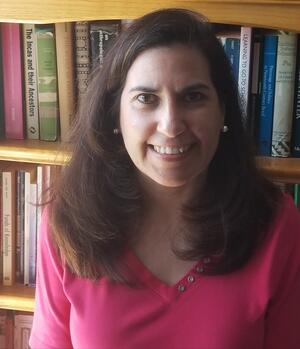
University of Illinois at Urbana-Champaign Alumnna
GRID Minor, 2012
PhD in Socioculutural Anthropology, 2012
Current Position
Associate Professor of Anthropology, and Program Director of Anthropology and Sociology, Parkland College, Champaign, Illinois
What is the focus of your current work and/or subject of your current research?
My work as both program director and faculty focuses on connecting anthropology students with the community through applied research. I work on and study pedagogical best practices to provide students with the analytical and data-gathering tools to apply to different career paths. Some examples of the applied work I and my fellow anthropology faculty do in our classes is train students in archaeological field methods and ethnographic research. We do this through a summer field school in partnership with the Illinois State Archaeological Survey for the first, and through participation in the Ethnography of the University initiative with the University of Illinois, where students study and document their own college communities, for the latter example. My personal research is centered on class mobility and nation building in the Bolivian Andes, with the Quechua indigenous women who have been my collaborators for over fifteen years. I have continued to publish and work with other scholars here and in Bolivia on this topic and know that my personal research informs my teaching, while engaging with students encourages me to continue investigating. A good example of this symbiosis between teaching and research is the publication of a children’s book on indigenous market women and migrant families that is distributed and read in children’s public library programs in Bolivia since I started this project in 2013. Helping educators in Bolivia raise awareness of the importance of the informal markets and the women who run them in their cities has been immensely rewarding. The same applies to training my students to apply their research to solve social issues and engage with the communities they study.
How has your GRID minor helped you in your career?
The anthropology program within my institution is housed in a Department of Social Sciences. Because of this, I am in constant contact and work with colleagues from history, psychology, sociology, economics, child development, criminal justice, political science, and geography. This past year alone I was the Principal Investigator (PI) for a small Title VI award that we applied to instructional design so we could infuse current scholarship on global studies in our classes. Working toward my GRID minor at Illinois taught me to welcome and benefit from cross-disciplinary work, a skill which I have applied to this project and other interdisciplinary initiatives. These types of collaborations are not easy for academics given the degree of specialization we gain in our fields. I am grateful to WGGP and my GRID colleagues for encouraging this side of my professional development!
Do you have any advice or suggestions for current GRID Students?
Following on my last answer, I would encourage GRID students to network with GRID colleagues in fields other than their own and explore ideas and research beyond their disciplinary comfort zones. Having this flexibility is not only useful in academia but in the non-profit and economic development world, and will serve them in good stead when they are out in the job market. Above all, I would tell them to enjoy the wealth and diversity of knowledge provided by the GRID community while they are at Illinois.
For more information about Isabel Scarborough please visit
- https://works.bepress.com/isabel-scarborough/
- The archive on the research some of my students have carried out in their own communities.
- A blog that details how the collaborative work with Bolivian educators was started.